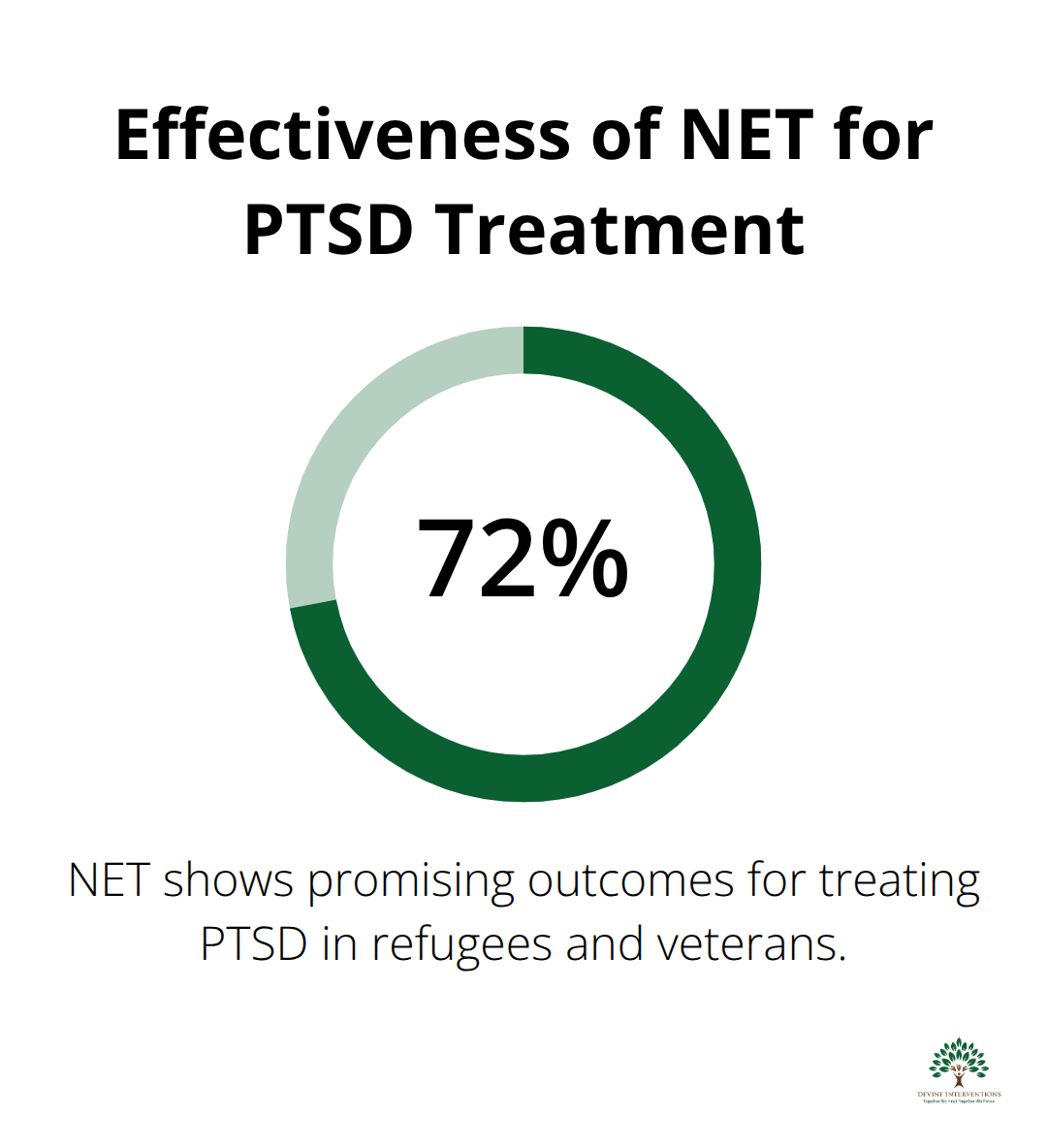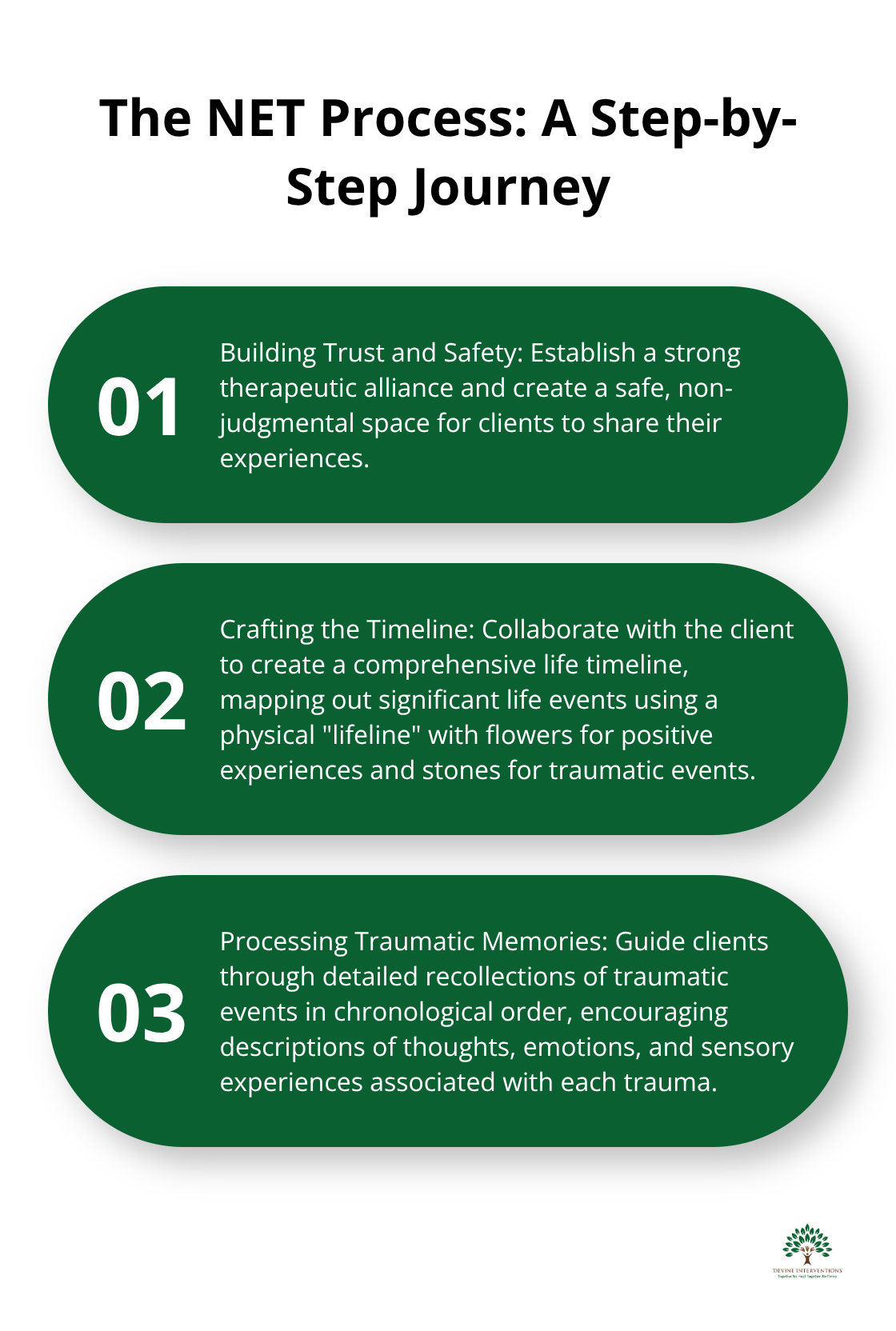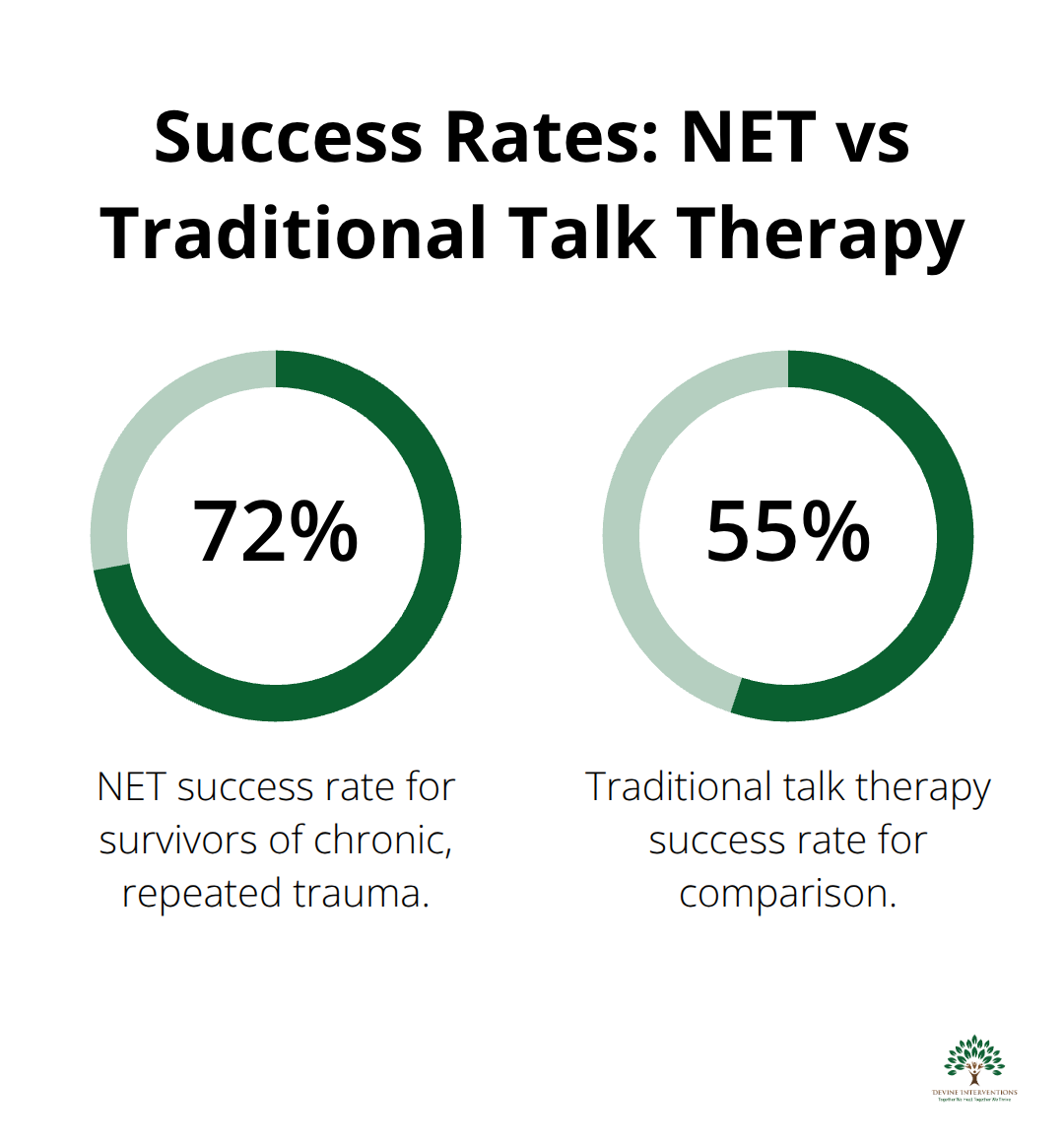Trauma can shatter lives, but healing is possible. At Devine Interventions, we’ve seen the transformative power of Narrative Exposure Therapy for trauma.
This innovative approach helps survivors reclaim their stories and find peace. In this post, we’ll explore how NET works and why it’s becoming a go-to treatment for trauma recovery.
What is Narrative Exposure Therapy?
Definition and Core Principles
Narrative Exposure Therapy (NET) stands as a powerful tool for trauma recovery. Developed in the early 2000s by Maggie Schauer, Frank Neuner, and Thomas Elbert, NET combines cognitive-behavioral therapy elements with storytelling techniques. This approach involves the construction of a chronological narrative of the client’s entire life, with a particular focus on traumatic experiences.
The NET Process
NET guides patients through a chronological retelling of their life events. Therapists pay special attention to traumatic experiences, encouraging detailed descriptions of thoughts, feelings, and sensory perceptions. This exposure helps process and integrate these memories into a person’s life narrative.
The therapy creates a coherent narrative of the patient’s life, which allows individuals to contextualize their trauma within their broader life story. This process reduces the intense emotional reactions associated with traumatic memories.
NET vs. Traditional Trauma Therapies
NET differs from some traditional therapies that focus solely on symptom reduction. Instead, NET aims to help patients find meaning in their experiences. This approach proves particularly effective for individuals with complex or multiple traumas.
Effectiveness and Research
Research supports NET’s efficacy. A 2019 meta-analysis revealed that NET has shown promising outcomes for treating posttraumatic stress disorder (PTSD) in refugees and veterans. The National Institute for Health and Care Excellence (NICE) recommends NET for treating adults with PTSD.

NET in Practice
At Devine Interventions (and other reputable mental health practices), therapists witness the transformative power of NET firsthand. The therapy offers hope to those struggling with trauma, providing a path to healing and reclaiming their lives.
As we move forward, let’s explore the specific steps involved in the NET process and how it unfolds in a therapeutic setting.
How NET Unfolds in Therapy: A Step-by-Step Journey
Building Trust and Safety
NET starts with the creation of a strong therapeutic alliance. At Devine Interventions, we prioritize establishing a safe, non-judgmental space where clients feel at ease sharing their experiences. This foundation proves essential for the emotional work ahead.
Our therapists dedicate 1-2 sessions to familiarize themselves with the client, explain the NET process, and address any concerns. This investment in rapport-building (which we’ve found to significantly enhance treatment outcomes) sets the stage for successful therapy.

Crafting the Timeline
The core of NET involves the creation of a comprehensive life timeline. Clients collaborate with their therapist to map out significant life events, both positive and traumatic. This visual representation serves as a roadmap for therapy.
We employ a physical “lifeline” – a rope or string laid out on the floor. Flowers symbolize positive experiences, while stones represent traumatic events. This tangible approach helps clients visualize the full scope of their life story.
Processing Traumatic Memories
With the timeline in place, therapy sessions focus on processing traumatic events in chronological order. Our therapists guide clients through detailed recollections, encouraging them to describe thoughts, emotions, and sensory experiences associated with each trauma.
This exposure component, while intense, proves crucial. Studies indicate that revisiting traumatic memories in a safe environment can significantly reduce PTSD symptoms. Narrative exposure therapy has shown promising outcomes for treating posttraumatic stress disorder (PTSD) in refugees and veterans.
Integrating the Narrative
As clients progress through their timeline, we assist them in weaving individual experiences into a coherent life story. This process often reveals patterns, strengths, and resilience that were previously overlooked.
Our therapists use specific techniques to facilitate this integration. For example, we might ask, “How did surviving that experience shape who you are today?” or “What would you tell your younger self now?”
Typically, after 6-12 sessions, clients complete a written narrative of their life story. This document serves as a powerful tool for ongoing healing and self-reflection.
NET’s structured approach offers a path to healing for trauma survivors. The next section will explore the specific benefits and effectiveness of NET, shedding light on why this therapy has gained recognition in the field of trauma treatment.
Does NET Really Work? The Evidence Speaks
Significant PTSD Symptom Reduction
Narrative Exposure Therapy (NET) proves highly effective in reducing PTSD symptoms. A recent meta-analysis found large non-controlled effect sizes at both post-treatment and follow-up from NET in adults with PTSD. These results indicate that NET outperforms many traditional therapies for symptom reduction.
Clients often report decreased nightmares, flashbacks, and hypervigilance after completing NET. One individual shared, “For the first time in years, I sleep through the night without reliving my trauma.”
Broader Mental Health Improvements
The benefits of NET extend beyond PTSD. Clients frequently report improved mood, increased self-esteem, and better relationships.
A study in the Journal of Traumatic Stress found that NET participants showed significant improvements in overall functioning and quality of life compared to control groups.
High Success Rates
NET boasts an estimated 72% success rate for survivors of chronic, repeated trauma. This surpasses the 55% success rate often seen in traditional talk therapy.

Many mental health practices (including Devine Interventions) find that about 3 out of 4 clients who complete NET report substantial improvement in their symptoms and overall well-being.
Versatility Across Trauma Types
NET’s effectiveness spans various trauma types and populations. It proves particularly powerful for complex trauma and multiple traumatic experiences.
Research in the European Journal of Psychotraumatology demonstrated NET’s efficacy with refugees, war survivors, and victims of childhood abuse. Mental health professionals successfully use NET with clients ranging from combat veterans to survivors of domestic violence.
NET’s structured approach makes it adaptable to different cultural contexts (a crucial factor in diverse communities).
Long-Term Benefits
Studies indicate that the positive effects of NET persist long after treatment ends. A follow-up study published in the Journal of Clinical Psychology found that NET participants maintained their improvements in PTSD symptoms and overall functioning up to one year post-treatment.
This long-term efficacy sets NET apart from some other trauma therapies that may offer only short-term relief.
Final Thoughts
Narrative Exposure Therapy for trauma empowers survivors to reclaim their stories and find healing. This innovative approach integrates traumatic experiences into a coherent life narrative, reducing PTSD symptoms and improving overall well-being. Research supports NET’s effectiveness, with success rates that surpass many traditional therapies for various trauma types and populations.
Professional help plays a vital role in trauma recovery. NET offers a structured, evidence-based path that has helped many individuals overcome trauma’s grip on their lives. At Devine Interventions, we provide comprehensive mental health services, including Narrative Exposure Therapy, to support your healing journey.
We encourage trauma survivors to explore NET as a potential treatment option. Our team of experienced therapists at Devine Interventions stands ready to offer compassionate, personalized care (tailored to your unique needs). Contact us today to learn how Narrative Exposure Therapy can guide you towards recovery and renewed hope.







